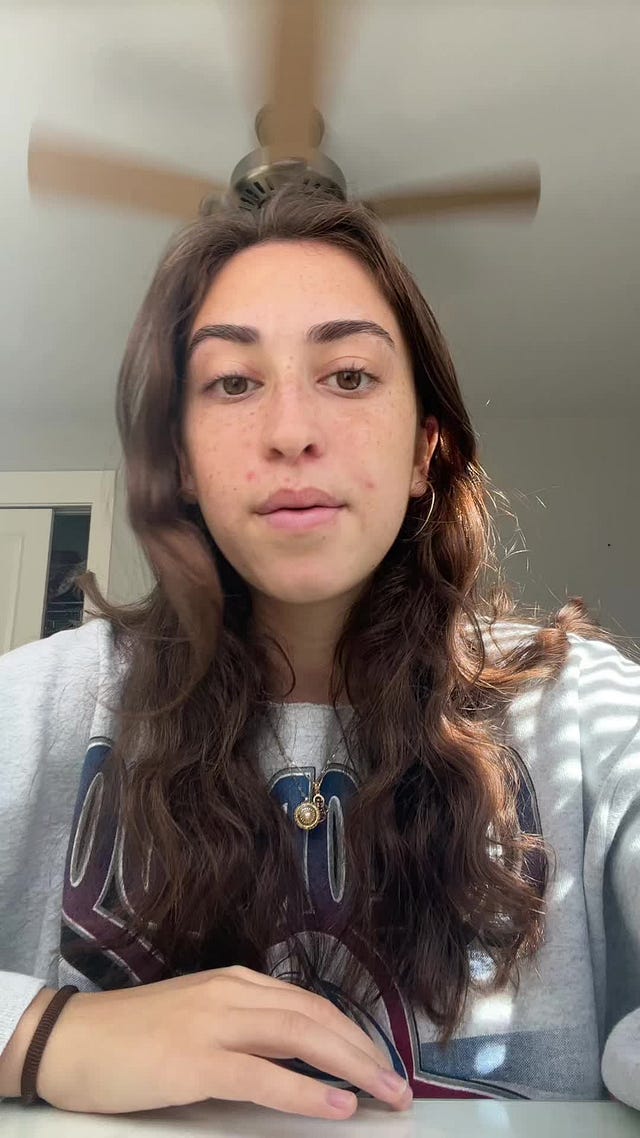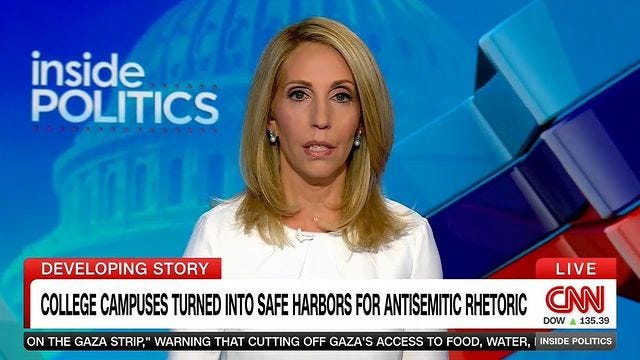How the immediate politicization of Hamas' attack on Israel impacted Jewish students
The on-campus reaction to Hamas' attack on Israel has forced many Jewish students to grapple with the uncomfortable reality that their peers have baseline disagreements over Israel’s right to exist.
For the past year, this platform has been a place to cover youth political culture, and the on-campus reaction to the tragic events of the past week is no exception. Dynamics between Israel and Palestine are complex, but speaking out against terrorism and antisemitism is not.
Hamas’ terrorist attack on Israel is still so raw and the suffering in its wake is palpable. October 7 marked the deadliest day in one place for Jewish civilians since the Holocaust. The devastation that will continue to follow with the war — both in Israel and in Gaza — will shape how our generation thinks about this conflict for the rest of our lives.
According to new polls from NPR/PBS NewsHour/Marist and CNN, younger Americans are less likely than their older counterparts to believe the US should publicly back Israel and that Israel’s military response to Hamas’ attack is justified.
There’s undoubtedly a time and place for thorny discussion about the centuries-old conflict, especially on college campuses, which have historically fostered freedom of speech, thought, and movements for civil rights and peace. There’s also a very legitimate conversation to be had about the treatment of Palestinian civilians, including in Gaza. But that’s not what happened on campuses this week, when Hamas’ attack on Israel was immediately politicized, forcing many Jewish students in particular to grapple with the uncomfortable reality that their classmates have baseline disagreements over Israel’s right to exist.
While campus Hillel and Chabad chapters held vigils, prayer services, and Israeli solidarity rallies, Students for Justice in Palestine — an umbrella organization with more than 250 chapters across the country — organized a ‘Day of Resistance’ with demonstrations at schools like Columbia University, Arizona State University, and University of Wisconsin, among many others. The national branch of Students for Justice in Palestine put out a toolkit at the start of last week to help their chapters organize rallies with messaging and framing guidelines. Yesterday at Harvard, my alma-mater, the Palestine Solidarity Committee and Graduate Students 4 Palestine held a large rally for Gaza. The demonstration came after some student groups across the country, like Harvard’s Palestinian Solidarity Committee and Graduate Students 4 Palestine, put out statements that failed to condemn Hamas or blamed Israel for the violence. In turn, some students involved in these groups received harsh criticism, and there has been doxxing on college campuses, including at Harvard – which is wholly unacceptable and was denounced by Harvard Hillel. There have also been a number of antisemitic incidents across the country, such as at Stanford, where an instructor was removed from their duties after reportedly singling out Jewish students and calling them ‘colonizers,’ or Drexel, which is investigating arson at a Jewish student’s dorm room door.
All of this has elicited emotional reactions from pro-Israel and pro-Palestinian students alike — many of whom have been on the forefront of movements like the Black Lives Matter Movement, gun safety movement, LGTBQ rights movement, reproductive rights movement, and are accustomed to standing up to injustice. It’s also shed light on the reality that while Jewish identity and Zionism don’t always go hand and hand, Jewish and Israeli students in the US are often made to feel ostracized on campuses during times of conflict in Israel. There are many elements to the campus dynamic debate this week, but this is where I will focus today.
Over the past week, I’ve had conversations with more than a dozen Jewish students, both undergrads and graduates. All have shown their passion, and compassion, for this issue and their communities. Some shared stories of sadness and frustration. Many said they’ve never felt more proud to be Jewish or Zionist. Some carefully articulated that just because they consider themselves a Zionist, does not mean they agree with everything the Israeli government has ever done. Many liberal Jewish students said their classmates’ animosity toward Israel (and immediate criticism of students who support Israel) goes against quintessential Gen Z values of open-mindedness and empathy.
Here are some of their stories.
Like many students, Sidney Stern, an 18-year-old freshman at American University, said social media is in part responsible for escalating tensions amongst students.
“I’ve had people confront me on campus about it because I’m a very outspoken Jew,” Stern said — adding that social media has the potential to erase nuance about the Israeli Palestinian conflict. Though Stern has stood up for Israel, she’s also spoken out against Israeli Prime Minister Benjamin Netanyahu. But her peers, “don't see that on social media all the time,” she said.
“I've had people come up to me and basically accuse me of being okay with genocide and things just like that, randomly on our quad or near my dorm room.”
“It’s a really interesting thing because I always feel like there are so many people that are like anti-Zionism isn’t anti-semitism. But whenever they see a Jew they immediately think of a Zionist,” Stern told The Up and Up. “I believe I am a Zionist. But I feel like Zionist the word has been very much mixed up with supporting Netanyahu… that’s not me.”
Sophie Bulkin, an 18-year-old sophomore at University of California, Berkley, said she’s “absolutely sickened by blatant displays of antisemitism” on her campus and campuses across the country this week.
Bulkin is intimately familiar with antisemitism. There was a deadly shooting at her family’s Poway, California synagogue in 2019, and she founded an organization to combat antisemitism in its wake. Bulkin said she went to a peaceful rally on UC Berkley’s campus last week, where she held a sign that read, ‘We’re saddened by the loss of Israeli and Palestinian lives,’ and yet, she said, “people still tried to politicize the event.”
“There’s a general stance among my generation that people shouldn’t be discriminated against. But then you look during these times and you see things being posted on social media that clearly juxtapose that belief,” Bulkin told The Up and Up.
She said everything she’s posted this week has referenced the Israeli people and Jewish people, rather than the Israeli government, but said her peers on campus “have a hard time separating the innocent citizens versus the government,” which flies in the face of Americans’ ability to criticize the United States government, while also demonstrating patriotism.
“The conflict is so complex and nuance. It’s difficult to present a side without facing backlash,” Bulkin said. “When you support the people of Israel right now it’s taken as you support the Israeli government. Regardless of my political beliefs I don’t think that there is any rationale or cause that could possibly justify the horrific massacre that occurred. Condemning the brutal acts of terror isn’t supporting Israel, it’s the basic responsibility we have as humans.”
Liza Bluman, a 21-year-old senior at Indiana University, said that while she’s in a Jewish sorority on campus, outside that context, she’s thought twice before bringing up her affiliation to Israel, where she worked this past summer, because she’s not sure how people will react. The same goes for being Jewish on campus.
“I don't know how to explain to them why it's hard to be Jewish. Why it's hard that every single time I want to pray with Jewish people there needs to be a police presence and that I'm scared to wear my Jewish star,” she said. “The same goes for my professors, I don't know how they're gonna handle things. I've brought up Israel in a couple of my classes in the past because if people say like, ‘Have you ever lived abroad?’ or ‘Do you have past work experience?’ both of those pertain to Jerusalem [for me], and I mean, it's just scary to bring it up.”
And yet, Bluman told The Up and Up, “Being Jewish is my number one thing in my identity in general. So I find myself bringing it up often.”
“One of my friends and I were walking the other day, and he was like, ‘Can you explain things to me? I got into a rabbit hole on TikTok, and I'm just, like, I don't really understand everything…’ he's Catholic and I was like, ‘Imagine if everyone grouped you in with everything the government in Rome was doing, or the government in Italy was doing, just because you're Catholic.’ And he was like, ‘That just like doesn't even make sense.' And I was like, ‘Exactly.’
Bluman has 1.1 million followers on TikTok and posted a video about Hamas’ attack on Israel last week, calling out the antisemitism and vitriol that has come on and off the platform in its wake. “Speak up for your Jewish friends,” she wrote in the caption. While she doesn’t usually take to TikTok to talk about current events or humanitarian issues and was nervous to post the video, she said: “this is an issue I just feel so strongly about, and I feel like if I don’t use my platform I’m wasting it.
“I could never in a million years pretend to not be Jewish. It's just so deep in my blood, and it's something I'm proud of,” Bluman said.
Tyler Winton, a 22-year-old senior at University of Texas, spent last summer living in Israel with two of his best friends and fraternity brothers. “We had the best time, we were partying, we were learning the culture, we were with Israelis immersed there for eight weeks almost,” said Winton. “So when this all happened… it really put it into perspective for us. We're living in freedom, and we're learning. If we were in Israel right now, we would be fighting. We would be in the war. And it's just it's just a crazy, crazy, different parallel,” he said.
Winton and a few of his friends teamed to start ‘Yalla’ Students Supporting Israel, a student group that now has over a Group Me chat with over 5,000 members. In less than 72 hours, Yalla raised $40,000 for the Israeli Defense Forces. The group has an Instagram profile, where it’s posting what it’s calling ‘Mi Sheberach’ (which in Judaism is a public prayer or blessing) videos from Jewish groups across the country, including chapters of Jewish sororities and fraternities like ZBT, SDT, AEPi and AEPhi (the founders are from ZBT at Texas), and groups like University of Mississippi Hillel.
“We started Yalla in order to support Israelis after the attack last weekend, for students who believe unequivocally that Israel has a right to exist,” Winton said. “The point of Yalla is to unite students around the country in support of Israel. So we can do good in the world. So students around the country, Jewish or not, feel united. We're all praying for peace to come quickly for both Israelis and the Palestinians,” Winton told The Up and Up.
More news 🗞
For a more in-depth view of how Jewish students are feeling on campus this week, read this: ‘Angry,’ hurt,’ ‘betrayed’: Jewish students grapple with lack of support on campuses, Gabby Deutch and Haley Cohen for Jewish Insider
For a social media analysis: What My Viral Post on Israel-Hamas Propaganda Really Means, an op-ed from Ben Sheehan for The Daily Beast
And a segment on how ‘College Campuses Turned into Safe Harbors for Antisemitic Rhetoric’ from CNN’s Dana Bash:
Thank you for reading The Up and Up. Please reach out with any thoughts, ideas, or concerns.






Would love to talk to you about this!!